Jake Dennis reflects on his career and Racing Steps Foundation's impact
Jake Dennis became Britain’s most recent world champion during Formula E’s last term, and now has a target on his back heading into season 10. Is it harder to win a title, or defend one? Either way, he’s not feeling the pressure...
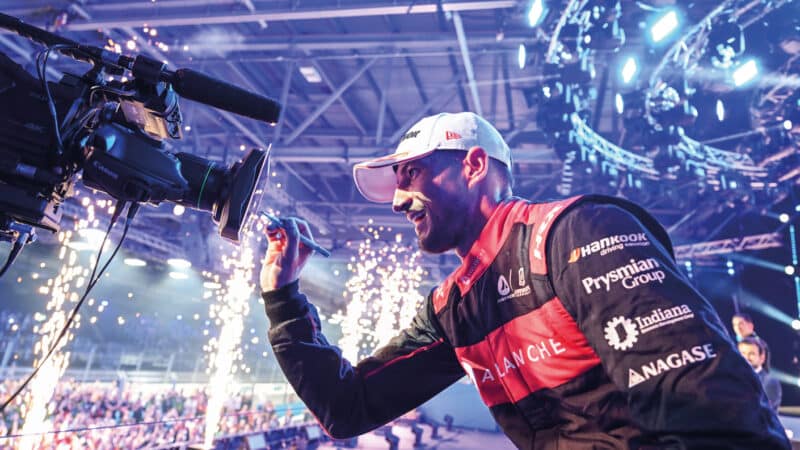
Sam Bagnall / LAT Images
Jake Dennis is officially a marked man. Having lifted his first senior FIA World Championship title back in July after a remarkable performance around the tight confines of London’s ExCeL, he’s now Formula E’s benchmark heading into season 10.
Yes, being the man everybody else wants to beat brings with it a certain weight of expectation, but being world champion also has its perks.
“It’s been a long road to get to this point, but it felt amazing to win the world championship, and it feels amazing being able to defend it,” smiles Dennis. “Nobody becomes a world champion overnight. The grind starts incredibly early in motorsport. I was world karting champion in KF3 way back in 2010, so it’s taken 13 years to add this one. I’m determined to hold on to it, but every year it seems like Formula E gets harder and harder to win. Still, for the first time I’m going into a championship with nothing left to prove. I know I can win, and so does the rest of the grid. In a funny way that takes a lot of the pressure off.”
Now set to return for his fourth Formula E campaign with the Avalanche Andretti team, 28-year-old Dennis has completed quite the career turnaround. His road to the top has been a winding one, with twists via junior single-seaters, endurance racing, GTs, and now back to elite-level single-seaters again, all while maintaining a behind-the-scenes presence in Formula 1 with one of the world’s greatest winning machines, Red Bull Racing.
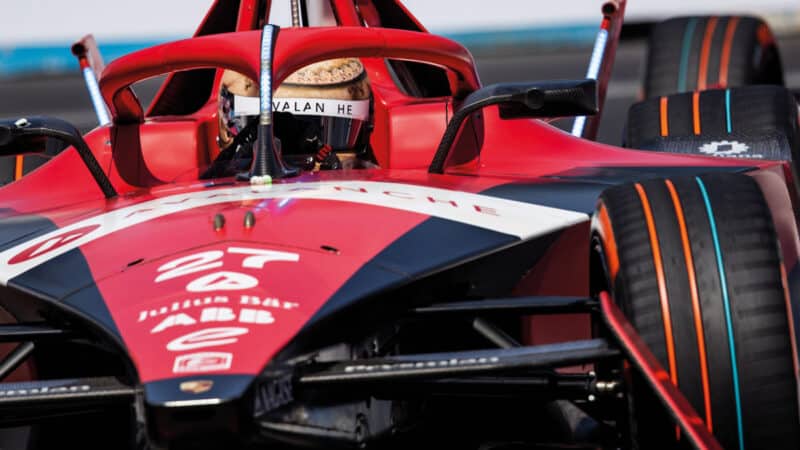
Dennis made his Formula E debut for the 2020 season, and is heading into his fourth campaign with the Andretti team
Key to his rise through the vast majority of that was the Racing Steps Foundation – a driver support programme that aimed to cherry pick the best of young British talent and fund their way up the junior formula ladder to the verge of Formula 1. Drivers such as Le Mans winner and FIA World Endurance champion James Calado, IndyCar racer Jack Harvey and fellow FE competitors Oliver Rowland and Oliver Turvey were all also products of RSF’s decade-long mission to push domestic talent onto the international stage.
Dennis was actually one of its longest-serving drivers, having been picked up in karting in 2008, and given a helping hand toward that first world title in CIK-FIA under-18 karting. His graduation to cars came in 2011 and brought him the inaugural InterSteps Championship title – a series essentially co-founded by RSF to help both its drivers and others smooth the step from karts into cars. That proved Dennis’s launching pad, and he’d go on to win in pretty much every category he contested – from European Formula 3 to GP3, when his career reached a crossroads at the end of 2016.
“Without RSF my career probably wouldn’t have gone anywhere,” he says. “I’m from a normal family with a normal background, and there’s no way you could get to the level I’m at now without the sort of support and funding RSF gave me, but it was clear that couldn’t always continue and I had to make my own way. I was with RSF pretty much throughout its existence, right up until it finished in 2017 and I had just signed my first professional contract, so the timing was perfect.”
That contract came with Audi as the Ingolstadt marque placed Dennis with its leading GT3 squad, Team WRT, for his first season as a factory driver. While that deal represented his first steps into a career as a fully-fledged professional racing driver, it could well have denied him the success he now enjoys in single-seaters.
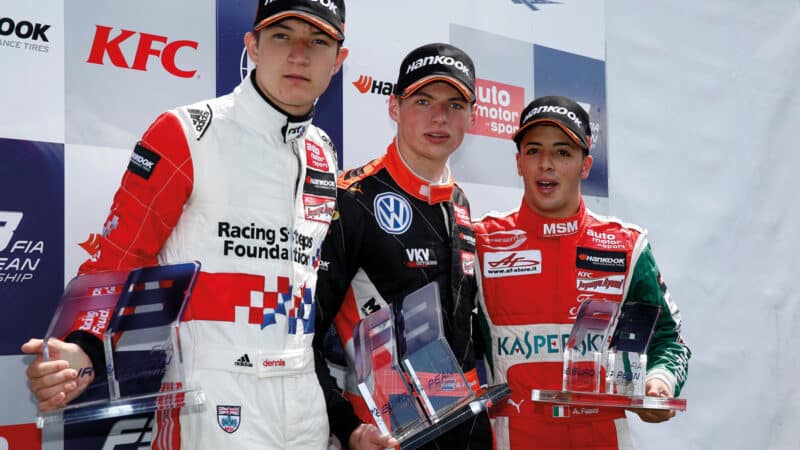
Formula 3 success in esteemed company alongside Max Verstappen and Antonio Fuoco in 2014
Getty Images
“I realise I’m lucky, as not many drivers get off the single-seater ladder and manage to get back on it again,” says Dennis. “The move to sportscar racing was a reality check. I was still a teenager in F3 and there was no way I had the money to get into F1, so it left me with two options; stay where I was and hope to get picked up by a young driver programme against the odds, or switch and chase a career. With a healthy manufacturer presence, sportscar racing was a chance to earn a living, and not just be coaching for the rest of my life. I put the F1 goal on the sidelines and joined Audi. I thought my life then was going to be all GTs.”
Turns out it was, but only for a few years. Dennis completed his first campaign with Audi, and then joined Aston Martin for its DTM programme before another chance came knocking, in the form of his Red Bull development driver deal.
“I’d been doing some sim work with Red Bull since 2017, and before that I was working with Williams during my F3 days, so I’d been around F1 for a while,” Dennis explains. “In 2018 Red Bull had the young driver tests coming up, but it didn’t have any drivers in the junior categories with the correct number of superlicence points. But I had them already, so I got the nod. I’ve been there ever since, working on the simulators, running race support programmes and helping the team gather data for its current cars, and future ones.”
It looked like Dennis was set to pull off the ultimate single-seater comeback when he was linked with a Toro Rosso seat soon after, but the licence points proved a roadblock. Although he held enough to test F1 cars, he didn’t have enough to actually race them. “It was very frustrating,” he says. “We even went direct to the FIA to try and get those points as by that stage I’d driven so much stuff – GTs, DTM, pro driver for five years, and they still wouldn’t grant me the licence. There’s nothing more we could have done. It’s just a shame.”
With F1 blocked off, you’d have thought his Red Bull links would’ve smoothed the path into Formula E, but that chance came around an entirely different way.
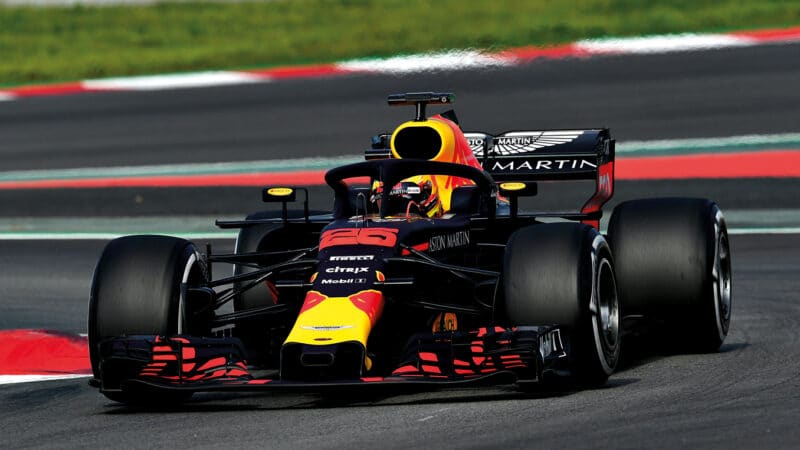
In Formula 1 test action with Red Bull Racing
Getty Images
“One of the top guys who worked at my GP3 team, Arden International, had made the switch to Formula E with BMW, and when Alexander Sims announced he’d be leaving FE, they put my name forward,” he says. “I was invited for a simulator test, which was ideal for me given my extensive running on the Red Bull sim, so that went well and led to a single-day test alongside the team’s regular driver Max Günther. My performance that day really put me in the frame.”
However, there was still a complication, chiefly the number of contracted BMW drivers about to come onto the market following the collapse of DTM in its previous form.
“Even after the test, I didn’t think I stood a chance,” admits Dennis. “DTM had just finished and suddenly BMW had six DTM drivers all hunting for the FE contract. Outside of F1, FE is the best option in terms of salary and career prospects. It’s natural they all went for it, but they chose me as I’d been the fastest guy. At the time Mike Krack [now Aston Martin F1 chief] was managing the BMW drivers and I imagine it wasn’t the smoothest boardroom pitch from him to get me in ahead of all the contracted DTM guys! Thankfully they went for it and I didn’t make him look stupid.”
Single-seater return secured, Dennis made his Formula E debut for season seven, although his impact wasn’t instant. Two retirements from the opening four ePrix wasn’t an ideal start and showed the level of learning curve for a driver coming into what is universally acknowledged to be a completely different world of racing.
With the Gen2 Spark cars by then well proven, many drivers had already unlocked the secrets of the chassis while Dennis was a rookie. Throw in FE’s calendar of tight, barrier-laden street circuits and it proved quite the challenge.
“It didn’t take me long to work out how ruthless Formula E can be. I’d come from GTs, big cars with bargeboards and door-to-door racing, but it’s a different level again”
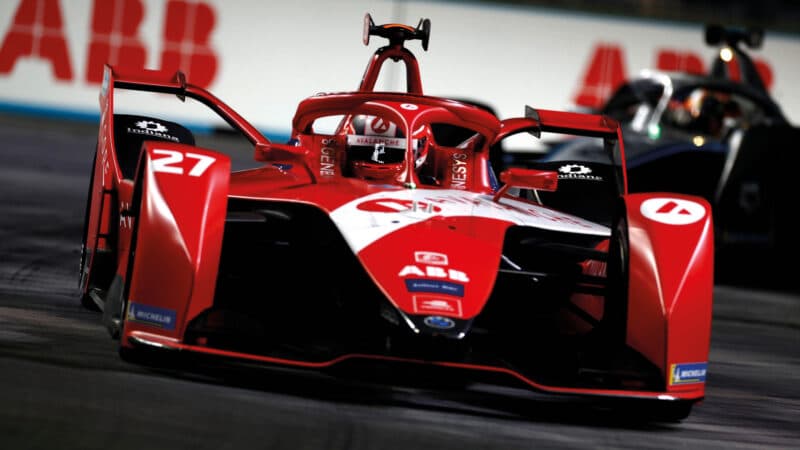
Dennis adapted fast to Formula E and here leads ex-F1 man Stoffel Vandoorne’s Mercedes-EQ
Edspick
“It didn’t take me long to work out how ruthless FE can be,” says Dennis. “Even though I’d come from GTs, big cars with bargeboards and door-to-door racing, FE is a different level again. Because of the very nature of the tracks you race on, it’s super-close and the Gen2 cars had those front fenders over the wheels so you could get into each other strategically and manipulate the positioning of other people’s cars without getting penalties. There was an art to doing it well and creating overtaking opportunities.
“In GT racing everything was a compromise. You had to share the car with two other drivers and compromise on everything from setup to seating position, so suddenly being back in that selfish world of single-seaters where you have everything as you like it took some time to revert to. Endurance racing had taught me how to build a group around you, as the teams were huge there with so many people and you had to forge relationships on a wide scale. Coming into FE, the teams were much smaller and you only really needed to worry about your engineer, performance engineer and mechanic.
“The first few races I wasn’t qualifying well. I just wasn’t quick enough. The car was clearly good, but I wasn’t, and that meant I was always starting right in the midfield scrap. I showed glimpses of pace but couldn’t put it together. I lost all confidence in myself and it started a bit of a spiral. I worked hard with the team to pull myself out of it and we found a breakthrough by actually dialling things back a bit.
“The software in Formula E is hugely advanced, and you have to hone the systems to give you a bit of forgiveness”
“The software in FE is hugely advanced, and you have to hone the systems to give you a bit of forgiveness. At the start I was focusing on pure performance, which meant if I was 1% over the mark it would punish me massively. Building in that bit of tolerance really helped because it didn’t throw away entire laps for tiny mistakes.”
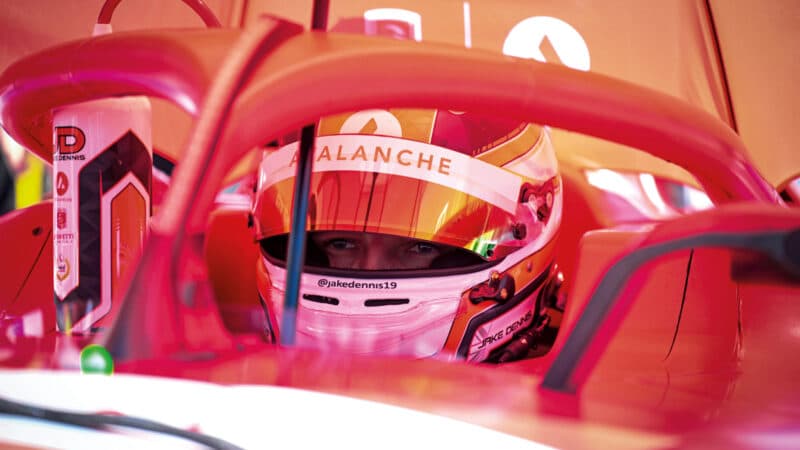
Pure focus on the grid
Armed with a stronger relationship with the team, Dennis made his breakthrough in Valencia where he scored the first of his two wins in the 2020-21 campaign. Given how tight FE is, a host of other top-10 results would elevate Dennis to third in the final standings, despite his tough start to life on the other side of the electric fence.
Dennis says “things just started to click” after that first race win, but there would be another hurdle to come when BMW withdrew at the end of that season, leaving Andretti to run the cars solo.
“The team got a lot smaller when BMW left,” says Dennis. “But actually, I think it worked in our favour as the whole atmosphere changed. The guys in the team are so professional, operating at a truly world-class level, but we always have fun with it and I feel we’ve hit a real high in the last two years.”
Dennis’s second season brought a single win – again on home turf in London – and sixth in the points during what was an adjustment period for the team following the loss of its German giant. The introduction of the current Gen3 car for season nine offered a reset, and further mixed a grid that had already been jumbled by BMW and Mercedes both departing.
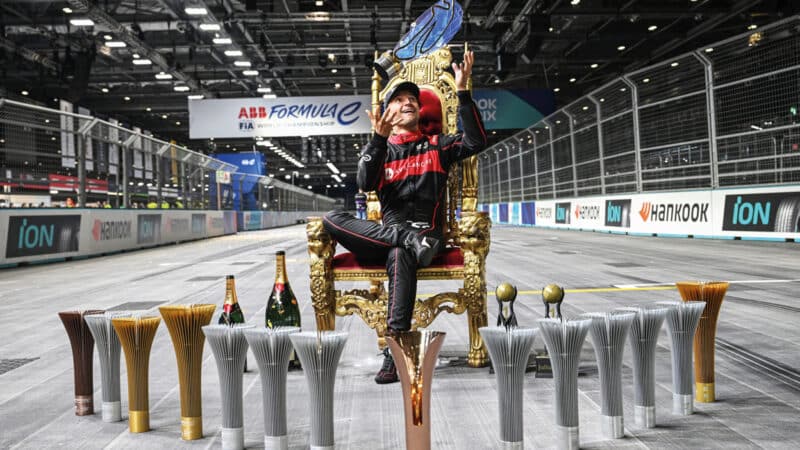
Two wins and nine podium finishes earned Dennis the title
Edspick
“Formula E proved a lot last season, mostly that it has serious staying power,” says Dennis. “Losing two big German brands would be a blow to any championship, but in came Nissan, McLaren and Maserati, which showed the pull this championship has.
“Having the new car also proved a big thing. I never drove the original FE car, and had only just got to grips with Gen2 when this new one arrives and it’s so much more powerful. They’re very fast now with 350kW on the street circuits, especially with the limitations of the tyres. In terms of technique, the Hankooks we have now are very similar to the Michelins we used to run, but have 30-40% less grip on the new cars. As a driver it’s actually quite easy to adapt to that because, yeah you slide about a bit more, but you have the power to correct that. The qualifying power is quite exceptional now. But there’s so many outside factors with the new engineering.
“Last season we were essentially debugging as we raced. You’d be getting errors mid-race you’ve never seen before and you’re having to clear them in the heat of the moment. There’s so many little niggles with new software. With Gen2, everybody understood the cars by then, they were robust and were never going to break. Last season was into the unknown. The cars were so on the edge at times that you never thought you were going to win a race until you crossed the line with the number of issues going on in the background.”
But win he did. First time out in Mexico, in fact. That kick-started a remarkable run of big scores, with Dennis finishing on the podium a further nine times, plus taking a second victory in Rome. He only retired once, and failed to score three times from 16 races. That consistency won him the championship amid a grid stacked with household names and grand prix backgrounds.
“Last year’s grid was incredible when you break it down,” he says. “Winning a championship in the first year of a new car is always difficult. Having such a good powertrain was crucial. I only see myself as a slightly better driver than I was in season eight, purely through the experience I now have. I’m always evolving and improving, but I had a better car last season, especially in race trim where it was one of the most efficient on the grid. Even when we didn’t qualify brilliantly the potential was there to move forward. I also kept a lot calmer and more focused, we did have low points, especially in that middle part of the season, but the consistency was always there to score the points we needed.”
While many drivers struggle to adapt to street circuits, Dennis seems to have found his groove.
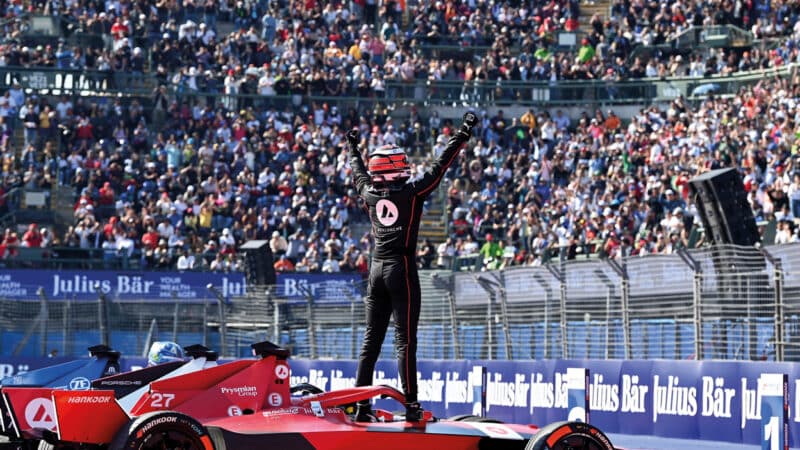
On home turf in London after sealing his first FIA Formula E world championship
Edspick
“The racing can be pretty sketchy, but I love it,” he adds. “It’s a consequence of many of the tracks being so tight yet so fast with the top speeds we’re doing. The cornering speeds are fine as we don’t have the grip to carry huge speeds round bends, but the arrival speeds are big and leave very little margin for error. There is a trend to moving to larger circuits, such as Monaco and Portland, and future car generations will definitely be more suited to those as they get progressively faster.
“As a driver you really do enjoy those tight and twisty tracks. In qualifying on full power it feels such a rush as the walls are right there and you’re on the edge everywhere. The racing can be pretty chaotic. But when you have these world-class drivers finessing it through the walls. It’s like playing Mario Kart with your eyes closed at some times.”
So, after three full years inside the FE bubble, how much has changed? The championship has certainly proved it has staying power, we’re gearing up for its 10th season after all. But it still has its critics.
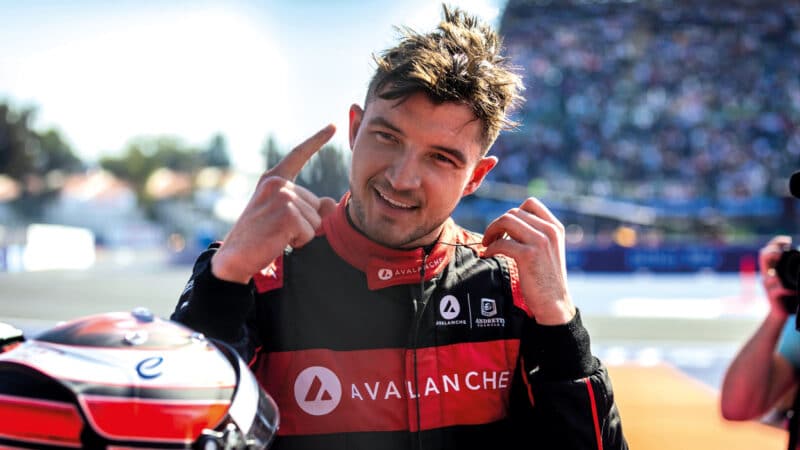
Despite heading into season 10 as the man to beat, Dennis insists he has nothing left to prove in Formula E, yet he has his eyes set on defending the world championship
Edspick
“FE is definitely still divisive,” adds Dennis. “I totally get that some people still have a problem with it. We’re all petrol heads really and we all miss screaming V8s and V12s. But the world has to move on. The way FE is evolving, it’s inevitable that this is going to be the future. More and more people are now understanding the level it’s at. It’s really world class now up and down the grid. I have the luxury of working in this and F1 and the level of operation is similar between the two, which shows how far we’ve come.”
While Dennis admits FE still has work to do around ‘the show’ it puts on for fans, comparisons with Liberty’s work in F1 need to be kept to a minimum. F1 is a global juggernaut, built on generations of history. FE is still remarkably young in comparison.
As Formula E hits its decade mark, what’s Dennis’s plan to keep himself out front?
“I feel way less pressure this year,” he summarises. “I feel like I’ve got nothing left to prove. I know how to win, and on those bad days I can reassure myself that I’ve been there and done it, I don’t need to go out there and push too hard and make mistakes. I think it’s going to be a more enjoyable experience now being the reigning champion. I’ll always put pressure on myself to perform, but deep down I know how to manage that now. I’m just determined to make this a really enjoyable season for all the right reasons.”
Formula E fact file
ePRIX entered 47
Wins 5
Podius 17
Poles 5
Laps led 190
Fastest laps 7
Championship points 446
Titles won 1
